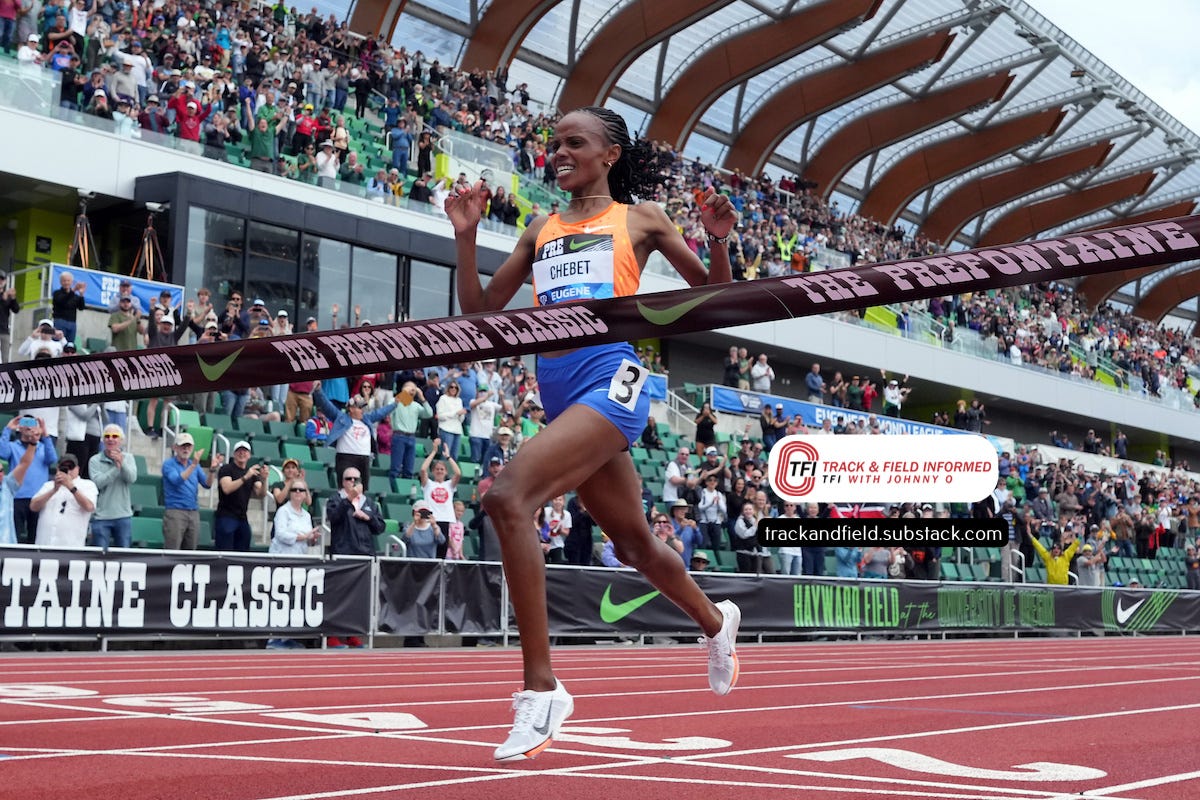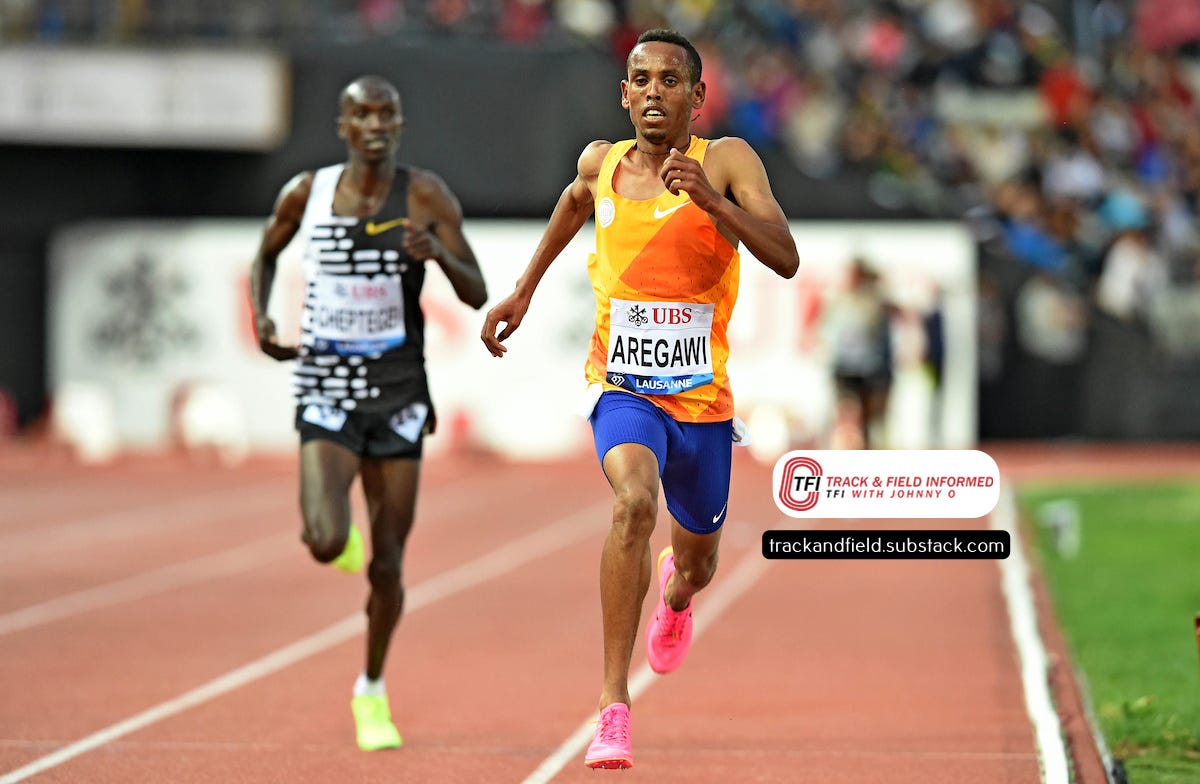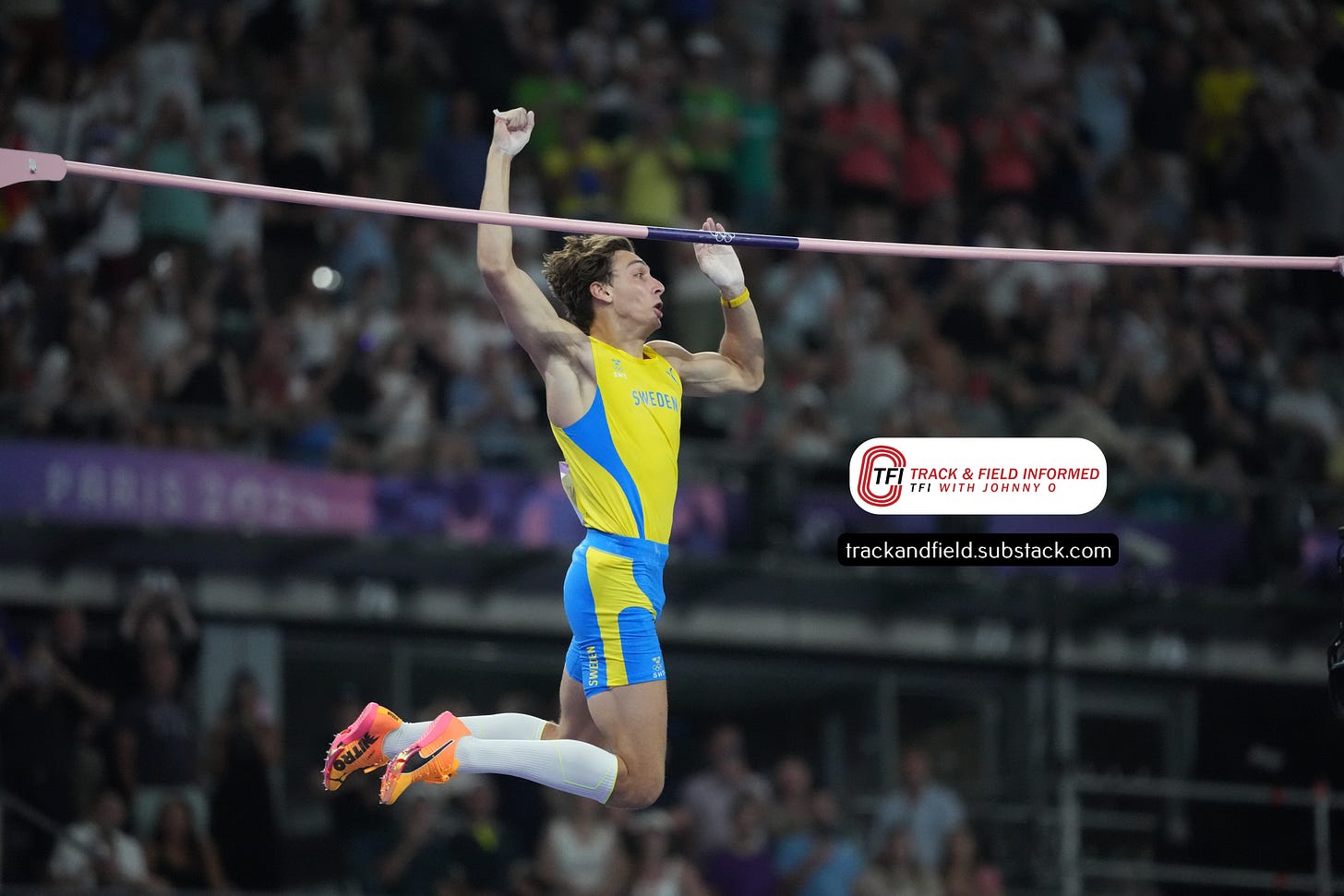Week in Review: Chebet breaks another major barrier
Kenyan becomes first woman to run under 14 minutes for 5,000 meters in road race

Beatrice Chebet of Kenya ended 2024 and began 2025 on a winning note with a pair of dominant performances last week.
First, the Olympic champion in the women’s 5,000 and 10,000 meters capped last year with a world record of 13 minutes 54 seconds over a five-kilometer road course in Barcelona, Spain, on Dec. 31 (Tuesday). Then, she began her competitive campaign for this year with a runaway victory in a cross country race in the Spanish city of Elgoibar on Sunday.
Chebet’s 13:54 clocking marked the first time that a woman had run under 14 minutes for 5,000 meters on the roads or on a track, and it crushed the previous 5k road best of 14:13 that she first ran in Barcelona on Dec. 31 of 2023.
Compatriot Agnes Ngetich had been credited with a 5k split of 14:13 split during the first half of her 28:47 world record for 10k in the Spanish city of Valencia last January, but Chebet’s performance last week annihilated those clockings.
“I’m super happy that everything went according to plan,” Chebet said in a World Athletics post. “I felt capable of running under 14 and I managed to do so. Two races in Barcelona and two world records, can I ask for more? My focus for next year is to win gold medals over 5000m and 10,000m at the World Championships in Tokyo.”
The 24-year-old Chebet, who had lowered the world record to 28:54.14 in the 10,000 on the track in the Prefontaine Classic last May, clocked 2:46, 5:35 (2:49) and 8:24 (2:49) at the one-, two-, and three-kilometer marks in Barcelona while being paced by Dmitrijs Serjogins of Latvia.
After Serjogins dropped out, Chebet was credited with a split of 11:09 at 4,000 meters after running the fourth kilometer in 2:45 and she capped her record run with another 2:45 split for the final kilometer of the race.
Medina Eisa of Ethiopia, who turned 19 last Friday, finished second in 14:23, the fastest ever by a U20 athlete, and she was followed by Belinda Chemutai of Uganda in 14:36, and Ethiopian Melknat Wudu in 14:53.
That trio had been four seconds back of Chebet when they came through the first kilometer in 2:50, but they fell farther and farther behind the Kenyan as the race proceeded.
Chebet’s fastest 5,000 on the track occurred in the Prefontaine Classic in September of 2023 when she ran 14:05.92 while finishing second to Gudaf Tsegay of Ethiopia, whose 14:00.21 effort smashed the world record of 14:05.20 that had been set by Faith Kipyegon of Kenya earlier in the year.
After her world record in the 5k in the Cursa del Nassos race in Barcelona, the heavily-favored Chebet rolled to her second consecutive title in the Cross Internacional Juan Muguerza in Elgoibar on Sunday. Her time of 25:49 over the 7.6-kilometer course left her 42 seconds in front of runner-up Wudu in the race that was a gold-level event on the World Athletics Cross Country Tour for the 2024-25 season.
After running the first lap on the track in 1:22, two-time defending World cross country champion Chebet proceeded to cover the first of three 2.2-kilometer cross country loops in 7:04 to take 24-second lead over her closest pursuer.
She then covered the next lap in 7:07 to lengthen her advantage by 46 seconds before covering the last loop in 7:02 while on her way to her winning time of 25:49.
Wudu clocked 26:31 to finish two seconds in front of Francine Niyomukunzi of Burundi in 26:33. Carolina Robles of Spain was another 30 seconds in arrears with a time of 27:02.
“Honestly, I expected to win,” Chebet said in a World Athletics post. “The circuit is arguably one of the toughest I have ever run with plenty of ups and downs, but at the same time it’s perfect to build up for the championships. Last year I won here and then became world [cross country] champion in Belgrade. I now return to Kenya to keep on training as I have not scheduled more races until [March 9], when I compete at the Lisbon 10K.”
While many will no doubt expect Chebet to run very fast in Lisbon, she was cautious when asked if she would attempt to better Ngetich’s world record in the Portuguese capital.
“That record is impressive, I’m not sure I can do that,” she said. “I’ll just try to win the race.”
Add Chebet: While Chebet was well clear of any woman after the first kilometer of her world-record 5k in Barcelona, she did have plenty of men to key off of during the final 4,000 meters of the race.
In addition to Serjogins, who dropped out after the first three kilometers of the contest, she ended up finishing two seconds back of Vid Botolin of Slovenia and Jinhu Mao of China, and a second behind Aleix Vives of Spain.
Matthew Kipkoech of Kenya and Pierrik Jocteur Monrozier of France were the top two men’s finishers with identical times of 13:28, followed by Addessamad Oukhelfen of Spain in third in 13:30.
Chebet finished 14th overall.
Another impressive double: Like Beatrice Chebet of Kenya, Berihu Aregawi of Ethiopia was victorious in both a road race and a cross country meet last week.
The Olympic silver medalist in the men’s 10,000 meters, Aregawi finished just ahead of Jacob Kiplimo of Uganda for the men’s title in the San Silvestre Vallecana event in Madrid on Dec. 31 when they were each credited with 10k times of 26:32.
He then finished a second in front of runner-up Rodrigue Kwizera of Burundi when he clocked 29:36 over a 9.7-kilometer course in the Cross Internacional Juan Muguerza in the Spanish City of Elgoibar on Sunday.
After being part of a six-runner lead pack through the first two kilometers in Madrid, Aregawi and Kiplimo, who had finished second and first, respectively, in the 2023 and ’24 World Athletics Cross Country Championships, were clear of the field when they came through three kilometers in 8:01 and the halfway point in 13:07.
They were still together when they passed eight kilometers in 20:58 after running the previous 3,000 meters in 7:51. Although it seemed possible at that point that the race might be decided by a hard-fought sprint finish, the two standouts never shifted into overdrive after entering Rayo Vallecano Stadium and Aregawi finished just in front of Kiplimo, who had pushed the pace for most of the contest.
While their times broke the previous course record of 26:41, their performances were not eligible for inclusion on various all-time lists because the elevation dropped 95 meters from the start of the race, where it was 705 meters above sea level, to the eight-kilometer mark, where it was 610 meters, before rising to an altitude of 650 meters at the finish.
There was a large gap between Aregawi and Kiplimo to the remainder of the field as Adel Mechaal of Spain placed third in 27:39, followed by Felix Bour of France in 27:42 and Nibret Kinde of Ethiopia in 27:44.
While Aregawi and Kiplimo appeared to have come to some sort of agreement not to put the pedal to the metal during the final 400 meters of that race, the 23-year-old Ethiopian had taken a two-second lead over Kwizera heading into the final of four 2.2-kilometer loops in Elgoibar before his 29:36 clocking left him a second ahead of the Burundian.
After the leaders had covered the first of those four laps in 6:47, the split for the second one was 6:27. Aregawi then covered the third loop in 6:12 before clocking 5:57 during his final circuit while off Kwizera, who had won four of his first five gold-level races on the World Athletics Cross Country Tour during the 2024-25 season.
After Aregawi and Kwizera, Samuel Firewu of Ethiopia finished third in 29:59, followed by Mechaal in 30:28 and Spanish compatriot Miguel Angel Martinez in 30:39.
“I had competed earlier this week in Madrid and the course is quite tough,” Aregawi said in a World Athletics post, “so I decided to be cautious for the first half, then I pushed hard and could get rid of Kwizera, who is a great rival.”

Upset special: Marta Garcia of Spain surprised many when she defeated Ruth Chepngetich of Kenya to win the women’s division of the San Silvestre Vallecana race in Madrid on Dec. 31.
The bronze medalist in the 5,000 meters in last year’s European Athletics Championships, Garcia ran 31:19 over the 10k course in Madrid to finish 13 seconds ahead of Chepngetich, who was two seconds in front of third-place Agueda Marques of Spain.
Chepngetich, who had lowered the world record in the women’s marathon to a stunning 2:09:56 in Chicago in October, said on the eve of the race that she was looking to lower the course record of 29:54 set by compatriot Brigid Kosgei in 2018. But Garcia was only two seconds behind her when Chepngetich came through five kilometers in 15:06 and the Spaniard caught her shortly after the six-kilometer mark.
The duo ran together for roughly the next kilometer, but the 26-year-old Garcia had opened up a significant gap over Chepngetich by the time she went through eight kilometers and the Kenyan was unable to close the gap over the final 2,000 meters of the race that rose by 40 meters in elevation.
“It’s my first time competing in this circuit and I’m impressed,” Garcia said in a World Athletics post. “I didn’t feel tiredness over the closing kilometres because the spectators cheered a lot, it’s amazing. I’ll now focus on the short track season over 3000m.”
Ethiopian sweep: Dawit Wolde and Ruti Aga of Ethiopia each lowered the course record while winning the men’s and women’s divisions, respectively, in the Xiamen Marathon in China on Sunday.
The 33-year-old Wolde won the men’s race in 2:06:06 after breaking away from his three closest pursuers in the last two kilometers of the contest.
Tebello Ramakongoana of Lesotho, who had finished seventh in the Olympic Games in Paris, placed second in Xiamen in a national record of 2:06:18.
The next three finishers were defending champion Asefa Boki Kebede of Ethiopia in 2:06:32, compatriot Chalu Deso Gelmisa in 2:06:45, and Ablelom Keseta Maryo of Eritrea of 2:07:05.
In the women’s race, the 30-year-old Aga had a large margin of victory as her time of 2:18:46 left her nearly four and a half minutes ahead of fellow Ethiopian Gutemi Shone Imana, who placed second in 2:23:11.
Fikrte Wereta Admasu completed the Ethiopian sweep when she finished third in 2:23:15. She was followed by Mercy Jerop Kwambai of Kenya in 2:23:58 and 2015 World champion Mare Dibaba of Ethiopia in 2:27:49.
Awards time: Mondo Duplantis of Sweden and Sydney McLaughlin-Levrone of the U.S. have been honored as the 2024 men’s and women’s athlete of the year, respectively, by Track & Field News.
Duplantis, who turned 25 in November, was a near-unanimous selection as he received 32 first-place votes and one second-place vote in balloting among an international panel of 33 people after going undefeated in the pole vault during a year in which he competed in 15 meets and raised the world record three times.
His third world record of the season — and 10th of his career — came in the Kamila Skolimowska Memorial in Chorzow, Poland, in August when he cleared 6.26 meters (20 feet 6½ inches).
Based on a scoring system in which a first-place vote is worth 10 points and a 10th-place vote counts as one, Duplantis totaled 329 points in the balloting while finishing well clear of 400-meter intermediate hurdler Rai Benjamin of the U.S., who was the runner-up with 206.
Emmanuel Wanyonyi of Kenya was third with 197 points, followed by Grant Holloway of the U.S. with 185 and Jakob Ingebrigtsen of Norway with 179.
In case you missed it, Track & Field Informed with Johnny O posted its list of the top 10 women’s and men’s athletes for 2024 on Jan. 1.
The voting for the women’s athlete of the year was tighter than the men’s as McLaughlin-Levrone totaled 290 points to the 267 of last year’s winner, 1,500-meter great Faith Kipyegon of Kenya.
McLaughlin-Levrone, 25, set two world records in the 400-meter hurdles during the season and was undefeated in the combined nine event finals that she contested in the 400 hurdles, 200, 400, and 100 hurdles.
Her second world record of the year — and the sixth of her career — in the 400 hurdles came in the Olympic Games in Paris in early August when her 50.37-second clocking bettered the 50.65 world record she had run in the U.S. Olympic Team Trials in late June.
The Nos. 3-5 finishers in the overall balloting were Beatrice Chebet of Kenya with 255 points, Yaroslava Mahuchikh of Ukraine with 252, and Marileidy Paulino of the Dominican Republic with 187.
Performance of the year honors went to Duplantis on the men’s side and to Mahuchikh on the women’s.
Duplantis’ second world record of the season was voted as the performance of the year as his winning effort of 6.25 (20-6) in the Olympic Games made him only the third man in history to have set a world record in the pole vault in the Olympics. He was the first to have done so since Wladyslaw Kozakiewicz of Poland cleared 5.78 (18-11½) in the 1980 Games in Moscow.
Mahuchikh was honored with the women’s performance of the year for clearing 2.10 (6-10¾) in the high jump in the Meeting de Paris Diamond League meet in July.
That effort topped the previous world record of 2.09 (6-10¼) that had been set by Stefka Kostadinova of Bulgaria in the 1987 World championships in Rome.

Kerley arrested: Numerous media outlets reported last week that Fred Kerley, the 2022 World champion in the men’s 100 meters, was arrested in South Florida late on the night of Jan. 2 after a confrontation with police led to a Taser being used on him.
An Associated Press post from January 3 said that according to an arrest report by Miami Beach police, officers were investigating an unrelated active police scene when Kerley approached the area and attempted to force his way through to his vehicle, which was parked nearby.
According to the report, officers had told Kerley to go around the area, but he began to argue with them, which eventually led to a shoving match with police and him being wrestled to the ground.
Four officers tried to take the 29-year-old Kerley into custody when he attempted to avoid being arrested. After being stunned with a Taser, he was taken to a local hospital and then to the Miami-Dade County jail, from which he was later released.
Kerley, who won a bronze medal in the 100 meters in last year Olympic Games after winning the silver medal in the same event in the Games in Tokyo in 2021, has been charged with battery, resisting an officer, and disorderly conduct.
In memory: Dr. Ralph Mann, the 1972 Olympic silver medalist in the men’s 400-meter intermediate hurdles for the U.S., died on January 2. He was 75.
A three-time NCAA champion in the 440-yard intermediate hurdles for BYU from 1969-71, Mann was the No. 1-ranked performer in the world by Track & Field News for the 1971 season.
He and defending Olympic champion David Hemery of Great Britain were considered to be co-favorites in the 400 intermediate hurdles heading into the 1972 Games in Munich, Germany. However, Mann finished second in 48.51 seconds and Hemery placed third in 48.52 when John Akii-Bua of Uganda lowered his personal best by more than a second while setting a world record of 47.82, despite running out of lane one.
That time bettered the previous world record of 48.12 which Hemery had set in winning the gold medal in the 1968 Olympics in Mexico City.
“I saw film of the race several times and I saw nothing I did wrong,” Mann was quoted as saying in the 1972 Olympic issue of Track & Field News. “I ran a perfect race—for me. It’s just that John’s was more perfect… I was pleased to see my name come up in second; first would have been better but if you are going to lose, then make the winner break the world record.”
Mann was ranked among the top 10 intermediate hurdles in the world every year from 1969-76. In addition to his No. 1 ranking in 1971, he was second in 1970 and ’72, and third in ’74.
He earned a bachelor’s degree in mechanical engineering and a master’s in physical education from BYU before being awarded a Ph.D. in biomechanics from Washington State University in 1975.
After teaching and conducting research at the University of Kentucky from 1975-82, he began a long career in which he specialized in sports performance analysis.
He worked with numerous standout track and field athletes through the years, including American sprinter Noah Lyles, who wrote in a social media post last week that Mann was “the crazy scientist that helped me and my coach turn me into the athlete I am today.”
He then added that Mann “brought a new way of thinking to my starting blocks that help me to become a great 60m runner and 100m Olympic Champion. I will forever be grateful for the love and support he showed me and for sharing his craft I will forever remember you . RIP Ralph and THANK YOU 🙏🏾 🕊️




